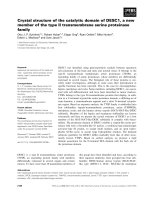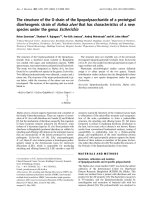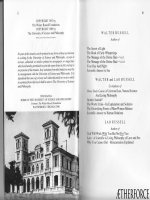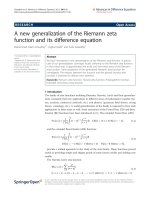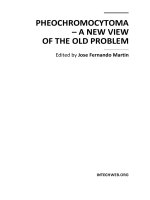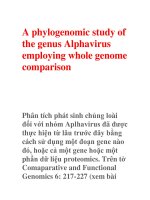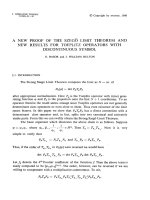A new species of the genus Plesiocoelus van Achterberg (Hymenoptera: Braconidae: Agathidinae) from Vietnam
Bạn đang xem bản rút gọn của tài liệu. Xem và tải ngay bản đầy đủ của tài liệu tại đây (6.18 MB, 6 trang )
TAPACHI
304-309
newSINH
speciesHOC
of the2016,
genus38(3):
Plesiocoelus
DOI:
10.15625/0866-7160/v38n3.8722
A NEW SPECIES OF THE GENUS Plesiocoelus van Achterberg
(Hymenoptera: Braconidae: Agathidinae) FROM VIETNAM
Khuat Dang Long1*, Cornelis van Achterberg2
1
Institute of Ecology & Biological Resources, VAST, Vietnam
Department of Terrestrial Zoology, NCB Naturalis, Postbus 9517, 2300 RA Leiden,
The Netherlands
2
ABSTRACT: Plesiocoelus van Achterberg is a rare genus of the subfamily Agathidinae
(Braconidae). The genus was established by van Achterberg in 1990 with one Neotropical species
included, Plesiocoelus bassiformis van Achterberg, 1990. Based on specimens deposited at the
Institute of Ecology & Biological Resources (IEBR) and Vietnam National Museum of Nature
(VNMN), the genus Plesiocoelus van Achterberg is newly recorded from Vietnam with a new
species, Plesiocoelus vietnamicus Long & van Achterberg, sp. n. described and illustrated in this
paper. Differences between the new species and P. bassiformis van Achterberg, are given.
Keywords: Braconidae, Agathidinae, Plesiocoelus, new record, new species, Neotropical, Oriental,
Vietnam.
Citation: Khuat Dang Long, Achterberg C. van, 2016. A new species the genus Plesiocoelus van Achterberg
(Hymenoptera: Braconidae: Agathidinae) from Vietnam. Tap chi Sinh hoc, 38(3): 304-309. DOI:
10.15625/0866-7160/v38n3.8722.
*Corresponding author:
INTRODUCTION
MATERIALS AND METHODS
Agathidinae is a moderately large subfamily
of Braconidae and has a worldwide distribution;
members of this subfamily are found in most
terrestrial habitats. In the recent revision of the
Agathidinae from Vietnam by van Achterberg
& Long (2010) [5], seventeen genera of
Agathidinae from Vietnam were revised. This
work gave an overview of the diversity of
Agathidinae of Vietnam and provided keys to
genera and all known agathidine species from
Vietnam. In this work, five genera, viz.
Hypsostypos Baltazar, 1963; Cremnoptoides
van Achterberg & Chen, 2004; Oreba Cameron,
1900; Aneurobracon Brues, 1930 and
Falcilagathis van Achterberg & Chen, 2004,
were supposed to be occur in Vietnam, but
unfortunately not found so far. Up to now, the
genus Plesiocoelus named by van Achterberg
(1990) [2] has one described species,
P. bassiformis van Achterberg from the
Neotropical region (Colombia, Ecuador and
Honduras), and this paper deals with a new
record for Vietnam and the description of one
new species, Plesiocoelus vietnamicus Long &
van Achterberg, sp. n..
Two following collections of the braconid
wasps from Vietnam used for this paper are at
the Institute of Ecology & Biological Resources
(IEBR) and Vietnam National Museum of
Nature (VNMN) at Hanoi. All specimens are
assembled during numerous expeditions in
Vietnam.
Terminology used in this paper follows van
Achterberg (1993) [3], and sculpture terms are
based on Harris (1979) [10]. For identification
of the subfamily, see van Achterberg (1993,
1997) [3, 4]; for the subdivision of the
subfamily see van Achterberg (1993) [3]; for a
key to the genera see van Achterberg & Long
(2010) [5], Sharkey et al. (2009) [14]; for
additional references and data, see Yu et al.
(2012) [17]. The photographs were made by the
first author with a Canon G15 camera attached
to an Olympus®SZ61 binocular microscope at
IEBR and and processed with Adobe Photoshop
CS5 to adjust the size and background.
The following abbreviations are used:
OD=diameter
of
posterior
ocellus;
OOL=ocular-ocellar line; POL=postocellar line;
304
Khuat Dang Long, Cornelis van Achterberg
S=south; MT=Malaise trap; NP=National Park.
‘Aga.+number’ is code number indexing for
specimens of the Agathidinae in the collection;
VAST stands for Vietnam Academy of Science
and Technology. The scale-lines of the plates
indicate mm.
RESULTS AND DISCUSSION
Taxonomy
Plesiocoelus van Achterberg, 1990
Plesiocoelus bassiformis van Achterberg,
1990:
44.
Type-species
Plesiocoelus
bassiformis van Achterberg, 1990.
Diagnosisof genus
Head somewhat elongate and with temple
distinctly concave behind malar space (fig. 2);
pedicellus medium-sized; frons distinctly
concave behind and near inner side of antennal
sockets (fig. 2), and with median crest,
continuing on dorsal third of face; prepectal
carina complete and low on mesopleuron (fig.
4); precoxal sulcus present posteriorly, and
absent anteriorly (fig. 4); mesopleuron largely
smooth; notauli narrow, complete, united in
front of scutellar sulcus (fig. 9); scutellum steep
posteriorly, without semi-circular depression
posteriorly, and carinate apically (fig. 9);
propodeum irregular reticulate-rugose, with
median carina short, indistinct and without
medial area (fig. 9); propodeal spiracle mediumsized and close to anterior margin of propodeum
(see fig. 8 in van Achterberg, 1990); vein 1-R1
of fore wing distinctly longer than pterostigma
(fig. 6); veins CU1, 2-SR+M, 2-SR and m-cu of
fore wing sclerotized; vein r of fore wing
emitted near basal 0.4 of pterostigma (fig. 6);
vein 2-CU of hind wing present as weak fold of
membrane only; length of fore tibial spur 0.4
times forebasitarsus (see fig. 3 in van
Achterberg, 1990); hind tarsus distinctly
depressed; length of inner hind spur 0.5-0.6
times basitarsus; hind trochantellus about as
long as hind trochanter (see fig. 10 van
Achterberg, 1990); hind tarsal claws with lobe
(fig. 11); apex of hind tibia with pegs (fig. 12);
length of first metasomal tergite 1.8-2.0 times
its apical width; second tergite with sharp lateral
crease (fig. 3, see fig. 10 van Achterberg, 1990);
second metasomal suture indistinct (fig. 3);
length of ovipositor sheath 0.5-0.8 times fore
wing; hypopygium of female medium-sized and
apically truncate (fig. 1).
Notes: Plesiocoelus van Achterberg, 1990
belongs to subtribe Mesocoelina [2] and this
genus differs from Aneurobracon Brues, 1930
by having the enlarged propodeal spiracles; the
less elongate propodeum; the concave temples;
the lack of scutellar depression posteriorly; the
tarsal claws with lobe; the pedicellus not
enlarged; the depression near inner side of
antennal sockets present and the short hind
trochantellus. Plesiocoelus differs from
Mesocoelus Schulz, 1911 by head more or less
elongate; prepectal carina and notauli present
(that completely absent in Mesocoelus); hind
tibia with row of pegs (fig. 12); tarsal claws
with lobe (without in Mesocoelus); veins r, 2SR, 1-CU1 and 2-CU1 of fore wing sclerotized.
Biology. Unknown.
Distribution. Neotropical; Oriental.
Plesiocoelus vietnamicus Long
Achterberg, sp. n. (Figs 1-12)
&
van
Material.
Holotype,
female,
(VNMN),
‘Aga.532’, S. Vietnam: Dong Nai, Cat Tien NP,
MT, 1-8.iv.2009, M. P. Quy, N. T. Manh.
Diagnosis. Female, small wasp, length of body
slightly shorter than antenna; fore wing
distinctly shorter than body (fig. 1); outer side
of middle leg with row of pegs (figs. 8, 10);
hind tibia with row of pegs (fig. 12); hind tarsal
claw with large lobe (fig. 11); hind tibial spurs
0.35 and 0.5 times as long as hind basitarsus;
wings faintly pigmented; fore wing with veins r,
2-SR, 1-CU1 and 2-CU1 sclerotized (fig. 6);
vein 1-CU1 of fore wing very short, much
shorter (0.1 times) than vein 2-CU1; vein M-CU
of hind wing slightly shorter than 1-M;
propodeum with short basal median carina,
reticulate-rugose (figs. 5, 9); propodeal spiracle
round, medium-sized, close to the upper corner
of propodeum; first metasomal tergite sparsely
striate; suture between second and third tergites
indistinct; the surface of second tergite
superficially coriaceous; third-sixth tergites
polished, smooth (fig. 3); ovipositor sheath 0.5
305
A new species of the genus Plesiocoelus
times as long as body length.
Notes. The new species differs from
Plesiocoelus bassiformis van Achterberg by
having: a)- in dorsal view length of eye 3.7
times as long as temple (2.8 times in P.
bassiformis); b)- Outer side of middle tibia with
row of pegs (fig. 9); c)- First metasomal tergite
sparsely striate (largely shiny and punctate in P.
bassiformis) and d)- Second metasomal tergite
shiny, coriaceous (superficially granulate in
P. bassiformis).
=3:2.5:5; distance between anterior ocellus and
hind ocelli 0.5 times as long as OOL (fig. 2);
face shiny, sparsely and finely punctate; frons,
vertex and temple smooth.
Description. Holotype, female, body length
3.2 mm; fore wing length 2.8 mm; antenna 3.3
mm; ovipositor sheath 1.51 mm (fig. 1).
Head. Antenna with 32 segments; middle
segments 3.0 times longer than wide (6:2); third
antennal segment 1.3 times fourth (8:6); length
of third, fourth and penultimate segments 4.0,
3.0 and 1.7 times their width, respectively;
length of maxillary palp 0.8 times height of
head; width of face as long as length of face and
clypeus combined; malar space 1.7 times as
long as mandible width (5:3); in dorsal view
length of eye 3.7 times as long as temple (11:3);
in lateral view, width of eye 3.3 times as long as
temple (10:3); ocelli medium, POL:OD:OOL
Figure 1. Plesiocoelus vietnamicus Long & van
Achterberg, sp. n., holotype, female, habitus,
lateral aspect.
2. Head, dorsal
aspect;
3. First - fourth
metasomal
tergites;
4. Mesopleuron;
5. Propodeum;
6. Fore wing;
7. Hind wing;
8. Outer side of
middle leg;
9. Mesosoma;
10. Row of pegs
on outer side of
middle tibia;
11. Hind tarsal
claw;
12. Outer side of
hind tibia.
Figures 2-12. Plesiocoelus vietnamicus Long & van Achterberg, sp. n., holotype, female
306
Khuat Dang Long, Cornelis van Achterberg
Mesosoma. Length of mesosoma 1.6 times
as long as high (49:30); propleuron crenulate
anteriorly, smooth posteriorly (fig. 4); median
lobe of mesoscutum sparsely punctate, lateral
lobes of mesoscutum superficially punctate,
smooth apically; notauli deep, crenulated (fig.
4); precoxal sulcus wide, rather long, punctate
(fig. 4); mesopleuron largely smooth;
metapleuron punctate; scutellar sulcus deep, 0.6
times as long as scutellum (3:5) with two strong
median carinae and two lateral short carinae
(fig. 9); scutellum carinate apically, nearly
smooth (fig. 9); propodeum with short basal
median carina, reticulate-rugose (figs 5, 9);
propodeal spiracle round, medium-sized, close
to the upper corner of propodeum.
Wings. Fore wing: length of pterostigma 1.6
times as long as wide (22:14) and 5.5 times vein
r; length of pterostigma 0.8 times as long as
vein 1-R1 (22: 28); vein r arising just before
middle of pterostigma (fig. 6); vein cu-a
vertical; vein 1-CU1 0.1 times as long as 2-CU1
(1.5:15). Hind wing: vein M+CU 0.92 times
vein 1-M (12:13) (fig. 7).
Legs. Apically inner and dorsal side of hind
coxa finely granulate, outer side of hind coxa
finely
punctate;
femur:tibia:basitarsus:
tarsus=30:39:21; length of hind femur, tibia and
basitarsus 3.75, 6.5 and 10.5 times as long as
their width, respectively; outer side of apical
half of middle tibia with row of five pegs (figs
8, 10); middle tibial inner spur 0.61 times
middle basitarsus (8:13); hind tibial spurs 0.35
and 0.5 times as long as basitarsus; hind
basitarsus as long as second-fifth tarsus; hind
tarsal claw simple with large lobe (fig. 11).
Metasoma. First tergite 1.8 times as long as
apical width (20:11) (fig. 3); medial length of
second tergite 1.4 times than third (14:10);
tergites 1 with sparse striae, smooth apically
(fig. 3); second tergite shiny, finely coriaceous;
third-sixth tergites polished, smooth; second
suture faint (fig. 3); ovipositor sheath 0.54 times
fore wing (62:115); ovipositor straight, slightly
curved at apex (fig. 1).
Colour. Brown; head and mesosoma darkish
brown; palpi ivory to white; scape and pedicel
light yellow; antennal flagellum yellowish
brown; fore and middle legs light yellow; hind
coxa and fermur light brown; trochanter and
trochantellus yellow; basal two third of hind
tibia whitish yellow; apical one third of hind
tibia yellowish brown; hind tibial spurs yellow;
hind tarsus yellowish brown; fore and hind
wings faintly pigmented (figs 6, 7); wings
yellow; fore wing with pterostigma, veins
C+SC+R, r, 2-SR and 1-R1 light brown; first
metasomal tergite dark brown, ivory apically;
second tergite ivory but yellow apically; firstsecond sternites ivory; third-six metasomal
tergites brown; ovipositor sheath brown.
Male. Unknown.
Distribution. S. Vietnam (Dong Nai).
Biology. Unknown.
Etymology. The name of the species originates
from the name of the country, where the
holotype was collected.
Acknowledgements: This paper has been
produced with the fund of the Vietnam National
Foundation for Science and Technology
Development (NAFOSTED).Thanks are due to
Ass. Prof. Mai Phu Quy and Dr Nguyen Thanh
Manh (IEBR) for providing specimens.
REFERENCES
1. Achterberg C. van, 1988. Revision of the
subfamily Blacinae Foerster (Hymenoptera,
Braconidae). Zoologische Verhandelingen
Leiden, 249: 1-324.
2. Achterberg C. van, 1990. Revision of the
subtribe
Mesocoelina
Viereck
(Hymenoptera: Braconidae). Zoologische
Mededelingen Leiden, 76: 31-57.
3. Achterberg C. van, 1993. Illustrated key to
the subfamilies of the Braconidae
(Hymenoptera:
Ichneumonoidea).
Zoologische Verhandelingen Leiden, 283:
1-189.
4. Achterberg C. van, 1997 Braconidae. An
illustrated key to all subfamilies. ETI World
Biodiversity Database CD-ROM Series
Amsterdam.
5. Achterberg C. van, Long K. D., 2010.
Revision of the Agathidinae (Hymenoptera,
307
A new species of the genus Plesiocoelus
Braconidae) of Vietnam, with the
description of forty-two new species and
three new genera. ZooKeys, 54: 1-184. doi:
10.3897/zookeys.54.475.
6. Bhat S., Gupta V. K., 1977. The subfamily
Agathidinae (Hymenoptera, Braconidae)
Ichneumonologia
Orientalis,
Oriental
Insects Mon., 6: 1-353.
7. Chen J. H., Yang J. Q., 2006. Hymenoptera,
Braconidae (IV), Agathidinae. Fauna Sinica
Insecta, 46: 1-301.
8. Chou L. Y., Sharkey M. J., 1989. The
Braconidae (Hymenoptera) of Taiwan. 1.
Agathidinae. Journal of the Taiwan
Museum, 42: 147-223.
9. Granger C., 1949. Braconides de
Madagascar. Memoires de l’Institut
Scientifique de Madagascar. (A)2: 1-428.
10. Harris R. A., 1979. A glossary of surface
sculpturing.
Occasional
Papers
in
Entomology, California Department of Food
and Agriculture, 28: 1-33.
11. Khuat Dang Long, Achtererg C. van, 2014.
An additional list with new records of
braconid wasps of the family braconidae
(Hymenoptera) from Vietnam. Tap chi Sinh
hoc, 36(4): 397-415. DOI: 10.15625/08667160/v36n4.5979.
12. Khuat Dang Long, Belokobylskij S. A.,
308
2003. A preliminary list of the Braconidae
(Hymenoptera) of Vietnam. Russian
Entomological Journal, 12(4): 385-398.
13. Sharkey M. J., 1996. The Agathidinae
(Hymenoptera: Braconidae) of Japan.
Bulletin of the National Institute of AgroEnvironmental Sciences 13: 1-100.
14. Sharkey M. J., Clutts S. A., 2011. A
revision of Thai Agathidinae (Hymenoptera:
Braconidae), with descriptions of six new
species. Journal of Hymenoptera Research
22: 69-132. doi: 10.3897/jhr.22.1299.
15. Sharkey M. J., Laurenne N. M.,
Sharanowski B., Quicke D. L. J., Murray
D., 2006. Revision of the Agathidinae
(Hymenoptera:
Braconidae)
with
comparisons of static and dynamic
alignments. Cladistics, 22(6): 546-567.
16. Sharkey M. J., Yu D. S., van Noort S.,
Seltmann K., Penev L., 2009. Revision of
the Oriental genera of Agathidinae
(Hymenoptera, Braconidae) with an
emphasis on Thailand including interactive
keys to genera published in three different
formats. ZooKeys, 21: 19-54. doi:
10.3897/zookeys.21.271.
17. Yu D. S. K., Achterberg C. van, Horstmann
K., 2012.Taxapad 2012, Ichneumonoidea
2011. Ottawa, Ontario, Canada. Database on
flash-drive. www.taxapad.com.
Khuat Dang Long, Cornelis van Achterberg
GHI NHẬN MỚI GIỐNG Plesiocoelus van Achterberg (Hymenoptera: Braconidae:
Agathidinae) VÀ MÔ TẢ MỘT LOÀI MỚI TỪ KHU HỆ CỦA VIỆT NAM
Khuất Đăng Long1, Cornelis van Achterberg2
1
Viện Sinh thái và Tài nguyên Sinh vật, Viện Hàn lâm KH & CN Việt Nam
Department of Terrestrial Zoology, NCB Naturalis, Postbus 9517, 2300 RA Leiden,
The Netherlands
2
TÓM TẮT
Plesiocoelus van Achterberg, 1990 là một giống hiếm gặp trong phân họ Agathidinae thuộc họ ong ký
sinh Braconidae. Giống Plesiocoelus được van Achterberg xác lập năm 1990 với một loài, Plesiocoelus
bassiformis van Achterberg, 1990, được mô tả từ khu hệ Nam Mỹ (Colombia, Ecuador và Honduras). Dựa
trên bộ sưu tập mẫu ong ký sinh hiện có tại Viện Sinh thái và Tài nguyên sinh vật và Bảo tàng Thiên nhiên
Việt Nam, bài báo ghi nhận mới giống Plesiocoelus van Achterberg, 1990 và mô tả một loài mới cho khoa
học, Plesiocoelus vietnamicus Long & van Achterberg, sp. n., từ khu hệ ong ký sinh Braconidae của
Việt Nam. Đặc điểm hình thái của loài này đươc minh họa bằng ảnh màu đồng thời cũng chỉ ra một số đặc
điểm hình thái so sánh với loài Plesiocoelus bassiformis van Achterberg, từ vùng Nam Mỹ.
Keywords: Ghi nhận mới, loài mới, ong ký sinh, Nam Mỹ, Đông Phương, Việt Nam.
Received 25 August 2016, accepted 20 September 2016
309
